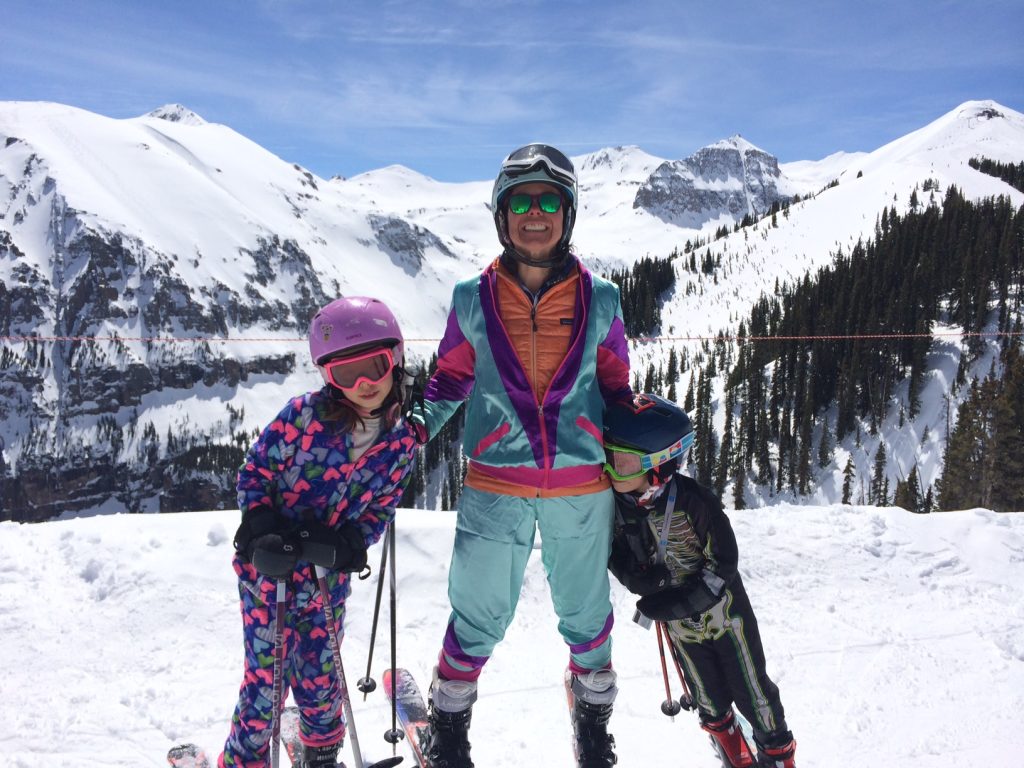
The author with her two young children. (Courtesy of Jen Parsons)
I live in a fancy Colorado ski town, I have two children, and I do not have a job.
After I deposit my children safely at their elementary school, I don’t head to work. This is when I take a break from the job for which no one gets paid: parenting. But I am a widow, parenting solo and, for now, the school days are my sanity savers.
We did not know there’d be Social Security Benefits as stage 4 cancer duked it out with chemo in my husband’s liver. During those hospital conversations, I imagined I’d pull out of the funeral home parking lot to the nearest Denny’s for my dishwashing shift. But Social Security arrives monthly and offers me a buffer from the grind of working while I adjust to raising my kids alone. A small life insurance payout grows in the stock market for the children’s future. These factors, along with a rental income from our home rebuilding endeavors BD (before death), offer me a freedom I hadn’t ever foreseen as a possibility in my life — having money without working a 9-5 job. I call this income my Tragedy Trust Fund.
READ: How to Approach a Financial Windfall — A Financial Therapist Weighs In
Many parents stay home with children, either because they’ve chosen to or because it makes economic sense for one parent to take on the weekday childcare instead of shelling out money for daycare. I’d been in grad school when I got pregnant. I finished my studies but didn’t join the workforce again as my husband and I shifted focus to family life. My husband died in 2015, and as of this year, both of my children are of school age and I officially have free time. I tell people I got a “time raise,” yet it’s also monetary — they’ve entered the public-school system and I no longer have costly preschool to pay for.
Yet I live in a town full of trust-funders, and it’s not always a compliment to be one. My husband and I, hard-working Yankees at heart, lived in this same ski town before we had kids. Here, I felt part of a community, and it fed my identity to work as the buyer for the town’s bookstore. I knew locals. I played a role in the rhythm of the town. The “working locals” band together to help each other get by. Now, I’m not sure if I’m one of them. Like being a widowed mother of young kids, not working further isolates me from my peer group.
The smug voice of my younger self creeps in during my daytime freedom, the voice of me when I had a husband and no kids yet. She arrives in my head as I sip my post-workout latte.
“Yoga Mom,” she sneers.
“Wellness!” I counter. “Put the oxygen mask over yourself so you can help the children next.”
Old acquaintances ask, “Where are you working?” They assume I’m back at work.
“I write when the kids are in school.” Polite, puzzled looks follow. “Does that pay?”
I imagined I’d pull out of the funeral home parking lot to the nearest Denny’s for my dishwashing shift. But Social Security arrives monthly and offers me a buffer from the grind of working while I adjust to raising my kids alone.
I exercise. I write. I take care of clothes and camps, meal preps and laundry. These are the things I have the energy for. Grief steals from you, even years after the loss. Raising a six- and eight-year-old alone feels like plenty.
READ: When It All Feels Like ‘Grief Yoga’
As I grow into living as a single parent, I accept my children will eventually need me less. I accept that I will enjoy another career again someday. Yet, for now, I must learn to accept that my earnings are different these days: I earn the view onto golden aspens as I climb mountains dusted with snow. I earn the shaky euphoria I enjoy when I hop off a bike. I earn the pages I’ve created with the words I’ve cast out. Monetarily speaking, it costs more to do these things than they pay back. Do I have guilt about this? Yes. Then I remind myself I’ve paid dearly, that my husband is no longer living and parenting alongside me.
When you are grieving, there are choices forced upon us, and those we make freely. I choose not to work, at least for now, and I’m well aware that is a choice that not every grieving person (or even most) is able to make. I do not live extravagantly, nor do I need to. My extravagance is time. My lone pair of jeans has a broken zipper. The windows of our home require a layer of plastic to keep us warm. I taught my kids how to flatten the wrinkled clothing with a hairdryer. But spare time is a gift, and a key to my survival right now. It would be another tragedy to fall apart.

The author enjoying the outdoors. (Courtesy of Jen Parsons)
Next time my smug young self has choice words, perhaps after a bike ride over a mountain pass or long hours with my journal, I think I’ll hug her. I’ll tell her I’m sorry, but one day she may know that some things can’t be solved with elbow grease. Cancer, loneliness, and fear may be immune to hard work. I’ll tell her one day she may get the free time to write she always wished for. It won’t be as she imagined but in the shadow of unimaginable loss.
Jen Parsons currently writes from a tarpaper shack sandwiched between multi-million-dollar homes in Telluride, Colorado. When she is not doubled over from an oxygen-deprived hike or bike ride, she is writing a memoir.








